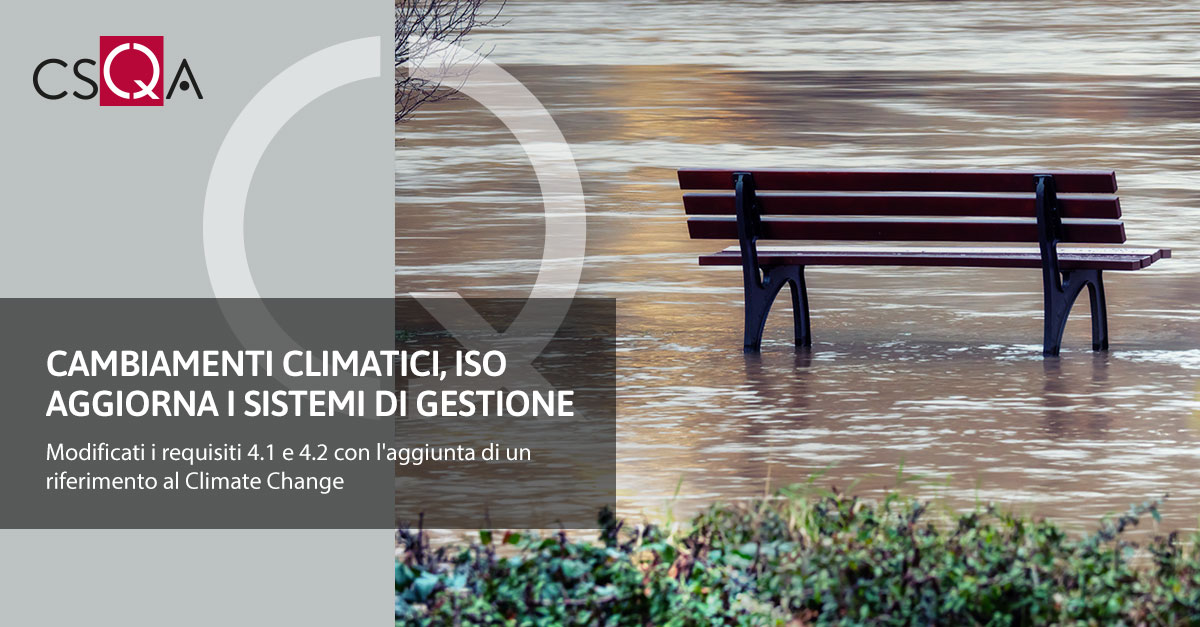 L'Organizzazione Internazionale per la Standardizzazione ha pubblicato una revisione delle norme dei Sistemi di Gestione introducendo richiami specifici alla gestione dei cambiamenti climatici da parte delle organizzazioni.
L'Organizzazione Internazionale per la Standardizzazione ha pubblicato una revisione delle norme dei Sistemi di Gestione introducendo richiami specifici alla gestione dei cambiamenti climatici da parte delle organizzazioni.
In particolare, sono stati modificati i requisiti 4.1 - Comprendere l'organizzazione e il suo contesto e 4.2 - Comprendere le esigenze e le aspettative delle parti interessate, con l'aggiunta di un riferimento al cambiamento climatico come fattore da valutare per l'analisi del contesto e per le aspettative delle parti interessate.
Qualora un'organizzazione utilizzi più di un sistema di gestione (ad esempio la gestione della qualità e la gestione della salute e della sicurezza), dovrebbe garantire che il cambiamento climatico, se ritenuto rilevante, sia considerato nell'ambito di applicazione di ciascuna norma del sistema di gestione.
E' bene specificare che l'anno di pubblicazione di ogni norma non cambierà.
Gli aggiornamenti
Il punto 4.1 delle nuove direttive richiede ora che le organizzazioni comprendano e considerino esplicitamente i rischi e le opportunità legati al cambiamento climatico nella fase di analisi del contesto aziendale: “𝘓'𝘢𝘻𝘪𝘦𝘯𝘥𝘢 𝘥𝘦𝘷𝘦 𝘤𝘰𝘮𝘱𝘳𝘦𝘯𝘥𝘦𝘳𝘦 𝘲𝘶𝘢𝘯𝘵𝘰 𝘱𝘰𝘴𝘴𝘢𝘯𝘰 𝘦𝘴𝘴𝘦𝘳𝘦 𝘳𝘪𝘭𝘦𝘷𝘢𝘯𝘵𝘪 𝘪 𝘧𝘢𝘵𝘵𝘰𝘳𝘪 𝘭𝘦𝘨𝘢𝘵𝘪 𝘢𝘭 𝘤𝘢𝘮𝘣𝘪𝘢𝘮𝘦𝘯𝘵𝘰 𝘤𝘭𝘪𝘮𝘢𝘵𝘪𝘤𝘰”.
Questo significa che le aziende dovranno valutare attentamente l'impatto che i loro processi potrebbero avere sul cambiamento climatico e pianificare di conseguenza, integrando la sostenibilità nel cuore delle proprie strategie aziendali.
Allo stesso modo, il punto 4.2 sottolinea l'importanza di comprendere le esigenze e le aspettative delle parti interessate in relazione al cambiamento climatico: “𝘓𝘦 𝘱𝘢𝘳𝘵𝘪 𝘪𝘯𝘵𝘦𝘳𝘦𝘴𝘴𝘢𝘵𝘦 𝘳𝘪𝘭𝘦𝘷𝘢𝘯𝘵𝘪 𝘱𝘰𝘴𝘴𝘰𝘯𝘰 𝘢𝘷𝘦𝘳𝘦 𝘦𝘴𝘪𝘨𝘦𝘯𝘻𝘦 𝘤𝘰𝘯𝘯𝘦𝘴𝘴𝘦 𝘢𝘭 𝘤𝘢𝘮𝘣𝘪𝘢𝘮𝘦𝘯𝘵𝘰 𝘤𝘭𝘪𝘮𝘢𝘵𝘪𝘤𝘰”.
Ciò implica che le organizzazioni devono essere sensibili alle richieste e alle preoccupazioni dei loro stakeholder riguardo alle questioni ambientali ed eventualmente intervenire per migliorare le proprie pratiche e ridurre l'impatto ambientale.
L'elenco delle norme specifiche a cui si applicano le modifiche:
-
ISO 14298:2021 Graphic technology — Management of security printing processes I
-
SO 16000-40:2019 Indoor air — Part 40: Indoor air quality management system
-
ISO 22163:2023 Railway applications — Railway quality management system — ISO 9001:2015 and specific requirements for application in the railway sector
-
ISO 22301:2019 Security and resilience — Business continuity management systems — Requirements
-
ISO 28000:2022 Security and resilience — Security management systems — Requirements
-
ISO 29001:2020 Petroleum, petrochemical and natural gas industries — Sector-specific quality management systems — Requirements for product and service supply organizations
-
ISO 30301:2019 Information and documentation — Management systems for records — Requirements
-
ISO 34101-1:2019 Sustainable and traceable cocoa — Part 1: Requirements for cocoa sustainability management systems
-
ISO 35001:2019 Biorisk management for laboratories and other related organisations
-
ISO 37301:2021 Compliance management systems — Requirements with guidance for use
-
ISO 46001:2019 Water efficiency management systems — Requirements with guidance for use
-
ISO/IEC 27001:2022 Information security, cybersecurity and privacy protection — Information security management systems — Requirements
-
ISO 21401:2018 Tourism and related services — Sustainability management system for accommodation establishments — Requirements
-
ISO 30401:2018 Knowledge management systems — Requirements
-
ISO 50001:2018 Energy management systems — Requirements with guidance for use
-
ISO/IEC 20000- 1:2018 Information technology — Service management — Part 1: Service management system requirements
-
ISO 19443:2018 Quality management systems — Specific requirements for the application of ISO 9001:2015 by organizations in the supply chain of the nuclear energy sector supplying products and services important to nuclear safety (ITNS)
-
ISO/IEC 19770- 1:2017 Information technology — IT asset management — Part 1: IT asset management systems — Requirements
-
ISO 21001:2018 Educational organizations — Management systems for educational organizations — Requirements with guidance for use
-
ISO 37001:2016 Anti-bribery management systems — Requirements with guidance for use
-
ISO 41001:2018 Facility management — Management systems — Requirements with guidance for use
-
ISO 44001:2017 Collaborative business relationship management systems — Requirements and framework
-
ISO 14001:2015 Environmental management systems — Requirements with guidance for use
-
ISO 15378:2017 Primary packaging materials for medicinal products — Particular requirements for the application of ISO 9001:2015, with reference to good manufacturing practice (GMP)
-
ISO 18788:2015 Management system for private security operations — Requirements with guidance for use
-
ISO 21101:2014 Adventure tourism — Safety management systems — Requirements
-
ISO 22000:2018 Food safety management systems — Requirements for any organization in the food chain
-
ISO 37101:2016 Sustainable development in communities — Management system for sustainable development — Requirements with guidance for use
-
ISO 39001:2012 Road traffic safety (RTS) management systems — Requirements with guidance for use
-
ISO 45001:2018 Occupational health and safety management systems — Requirements with guidance for use
- ISO 9001:2015 Quality management systems — Requirement
L'inclusione di tali requisiti relativi alla lotta contro il cambiamento climatico fin dalla fase di analisi del contesto aziendale rafforza l'impiego dei sistemi di gestione come strumenti strategici per la transizione sostenibile.
Questo aggiornamento non solo sottolinea l'impegno delle organizzazioni verso la sostenibilità, ma le aiuta anche a identificare opportunità di innovazione e crescita all'interno di un'economia sempre più orientata alla sostenibilità.